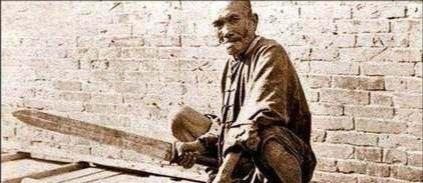In ancient China, there were many cruel types of work, such as slaves, eunuchs, prostitutes, etc., due to feudal superstition and lack of humanistic care, these types of work can be said to have almost bought out the personal freedom of practitioners, and carried out double suppression in spirit and body, leaving people with nowhere to escape.

And there is a kind of work, although the practitioners have absolute personal freedom, and the remuneration is very much, the work is also very simple, it can be said that the money is more troublesome and less close to home, to meet all the beautiful imagination of office workers. But the average person will not do it at all, only young adults from poor families will choose to do it. This is the executioner.
Among the extremely brutal means of punishing people in ancient times, in addition to waist beheading, hanging, car splitting, Ling Chi, and five horses splitting corpses, the more common is to cut the head. Beheading means beheading, and executioners specialize in this profession. Most of the people who can become executioners are poor people from poor families, but they are not able to do it, and this profession requires that people must be strong, able to bear hardships and stand hard work, and be mentally prepared to be spurned and cut off. Although it is only a process of beheading, it is also necessary to learn the art from a teacher, with experienced teachers and masters, through extremely rigorous training.
An executioner at the end of the Qing Dynasty, Deng Haishan, a native of Changsha County, once said that before entering the industry, you must find a good master, and after worshiping the teacher, you must train hard every day. (Note 1) First of all, you must practice strength, and after reaching a certain level, you will start practicing knife work. Starting from practicing cutting melons, control the speed, a knife down to cut the melon into two petals, but can not be split immediately, until the knife is withdrawn, the melon can gradually split. After practicing this trick, it is also necessary to practice with burning incense, that is, to stand with a branch of incense and burn it, and the person holding the knife is split horizontally, and the knife is broken by the incense, and the following section must not move to pass the pass. It's the perfect combination of strength, speed and know-how. Finally, it is also necessary to practice animal guts, cats and dogs, pigs, sheep, etc., and to be not alarmed by the blood spray to pass the level. After that, you can go to the execution ground with the master, and when the process is completed, you can officially take up your post through the introduction of the master.
Deng Haishan once said that before taking up his post, his master warned him that he must not cut more than 100 people, and when he cut 99 people, he must retire, otherwise he will be punished. But he did not heed the advice, beheading nearly 300 people until the late Republic of China shooting on the stage of history, the executioner's industry was completely abolished.
However, Deng Haishan, who was accustomed to this profession, suddenly lost his dependence, and usually became accustomed to being extravagant, because the executioner's income was very high, in addition to the regular remuneration, there was also some money from his family, so everyone spent money like water. In the end, Deng Haishan, who was lonely and helpless, had no relatives and friends to help, and in desperation, he planned to become a monk. But when the abbot heard of his origins, he refused, saying that his sins were too heavy and that the Buddha could not survive them. At this time, he remembered the master's words, helplessly too late, the retribution arrived, a lonely floating in the world. The "Ta Kung Pao" of the Republic of China period reported that Deng Haishan, the last executioner of the late Qing Dynasty, was interviewed when he was more than a flower armour, probably because the first half of his life was too fierce and killing too much, and his only wish in his later years was to eat and pray to the Buddha whenever there was nothing to do. On November 22, 1925, he was very upset that he had been accused of killing hundreds of people in his profession and was not eligible for goodness...